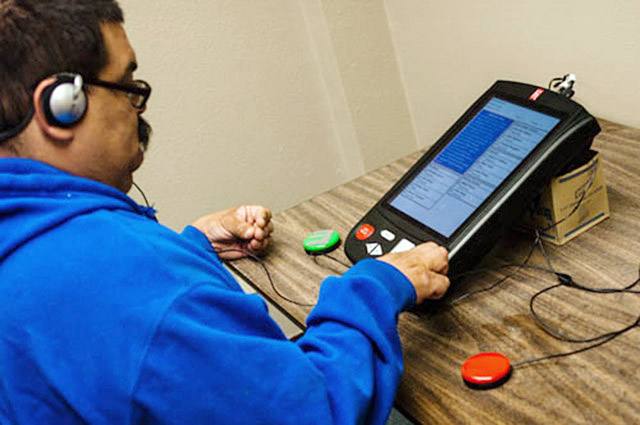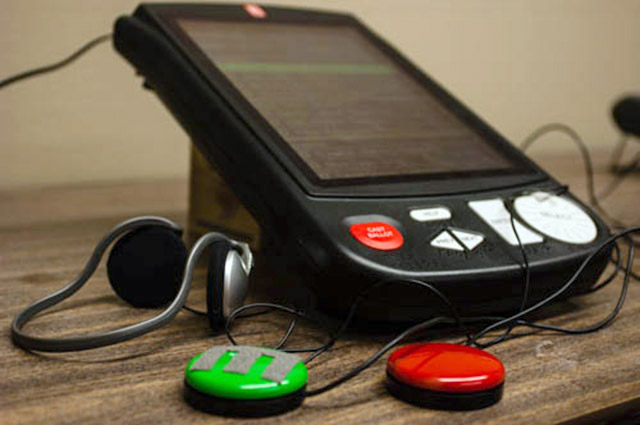Voting Hurdles Remain for People With Disabilities, Advocates Say

Austin resident Juan Munoz practices voting on a machine set up to assist voters with disabilities. Photo by Natalie Krebs.
By Beth Cortez-Neavel
For Reporting Texas and Dallas Morning News
AUSTIN — David Fowler dreads the memory of the time when he could not vote on his own.
Fowler, 52, is paralyzed from the shoulders down. Before electronic voting machines and specially designed attachments for people with disabilities, Fowler needed a polling assistant to help him cast his ballot.
Once, when he told a helper to mark his vote, he heard her sigh, “almost like she could not believe that I was actually putting a mark and voting for that person,” said Fowler, president of the Texas Chapter for Paralyzed Veterans of America. “I found it very, very insulting and encroaching on my rights. It turned me off so much that basically I didn’t show up and vote again … just because I didn’t want to go through that experience again.”
In 1999, Texas became the first state to require all new voting systems to be accessible to people with disabilities and to provide “practical and effective means” so voters can cast a private ballot. Today, under the federal Help America Vote Act enacted in 2002, every polling place must offer at least one voting machine accessible to people with disabilities.
But voters with disabilities still lag in participation. A study published in July found that the overall voting rate of people with disabilities was 7.2 percent points lower than able-bodied voters in the 2008 presidential election and 3.1 percentage points lower in 2010.
The study estimated that had the groups participated at the same rate, more than 3 million additional votes would have been cast in each election.
Dennis Borel, the executive director at the Coalition for Texans with Disabilities, said this election is crucial for people with disabilities.
“There is a considerable fear among our community,” he said. “They’re seeing a retreat from public health and public services for people with disabilities. It’s undeniable. They know that the last Legislature left $5 billion of Medicaid services unfunded.”
The problem, he and others said, is that issues of importance to the group are not being discussed.
“I haven’t heard a word about people with disabilities mentioned by any of the candidates,” Fowler said. “What I have heard is programs are going to be cut and they’re being real general about what’s going to be cut.”
In Texas, the Governor’s Committee on People with Disabilities encourages “full participation by people with disabilities in all aspects of state and local government, including in the act of voting,” Josh Havens, a spokesman for Gov. Rick Perry said in a written statement. “Voting leads to action, and action leads to results.”
Many voters with disabilities, Borel said, have either had a bad experience voting or have heard from others who have, making them more reluctant to go to the polls.
Gravel parking lots or driveways, round doorknobs, stairs, ramps with too much of an incline and even low-hanging branches can create barriers.
“Even little things like that can prevent somebody from independently being able to go to the polls,” said Ginger Mayeaux, voting rights specialist for the advocacy agency Disability Rights Texas. Others, she said, “just don’t go to vote because they don’t want to be embarrassed or they don’t want to get help to do something that they could do independently if it was accessible.”
The Coalition for Texans with Disabilities, along with Disability Rights Texas, is working to educating people with disabilities, election officials and poll-workers to change the word-of-mouth about voting and to ensure the continued accessibility to polling places. “If you don’t know that you have the right to an accessible machine or accessible polling place,” Mayeaux said, “you can’t use it.”
In addition, a large number of people with disabilities are not registered to vote, partly because registration is often done while obtaining or renewing a driver’s license, and they don’t drive.
Federal law requires that state agencies serving people with disabilities also act as registration centers, including Medicaid offices and assisted-living centers. But “it’s not trickling down,” Mayeaux said.
Others are stymied once they get to the polls. They may be denied access curbside voting, in which a battery-powered electronic voting machine is brought to their car. Or they may find that their polling site does not have necessary modifications, such as headphones that can plug in to the machine.
The majority of inaccessible polling places in Texas are in rural areas with older structures more difficult to modify. “In urban populations, it’s higher up on the agenda,” Borel said.
And even if the polling site is accessible, Borel said, “the No. 1 complaint we hear from voters with disabilities is actually that the poll workers don’t know how to interact with them or have them have a positive voting experience.”
Fowler, who is voting again after skipping it for years, thanks to a stick he controls with his mouth, said independence is what counts.
“Most of us have worked really hard to gain all the independence that we can, and voting is a very important process that should be done independently and without the forced help of someone else,” he said.
Correction: A previous version of this article misquoted Dennis Borel when he spoke about the amount of unfunded Medicaid services.
